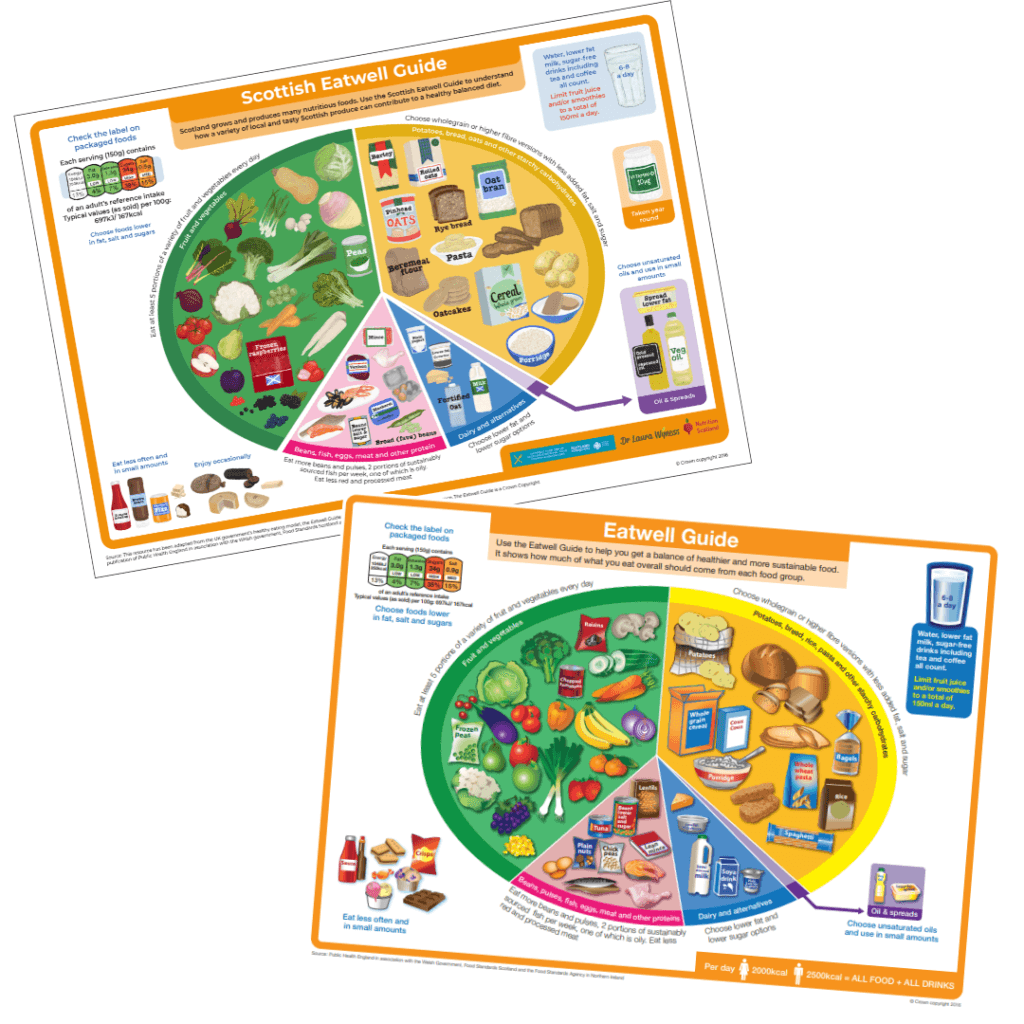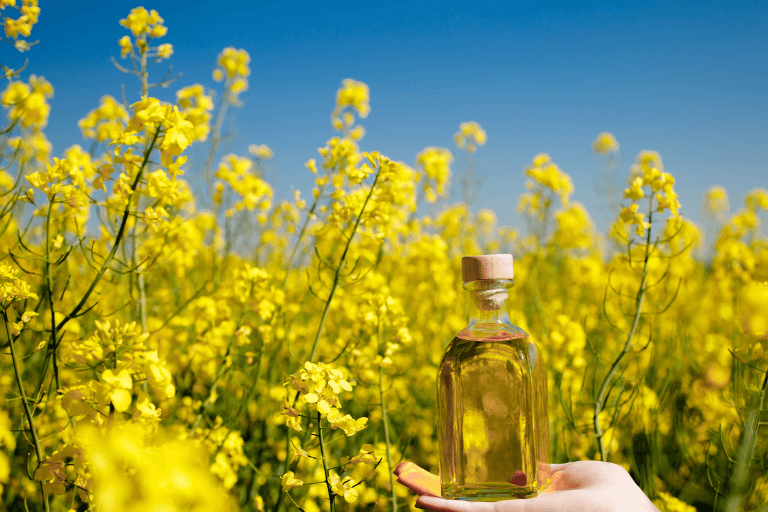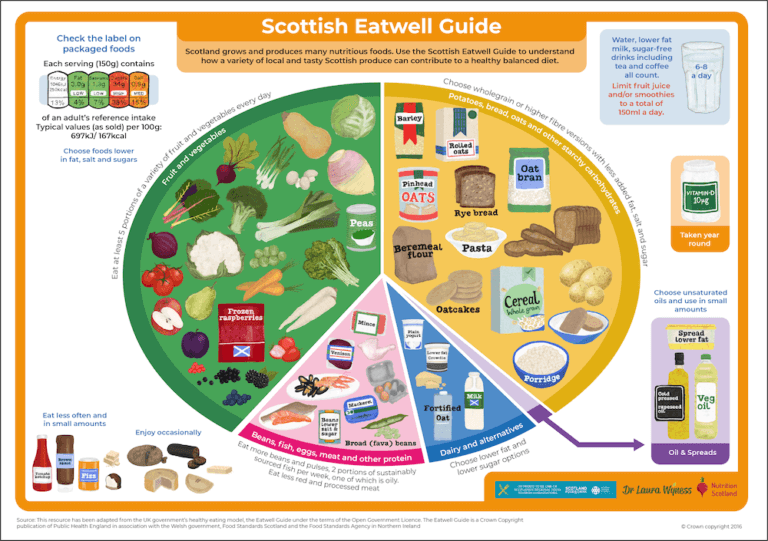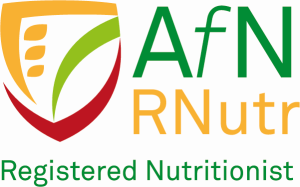Although similar in many aspects, there are a few key differences between the Scottish Eatwell Guide and the UK Eatwell Guide. Whilst the proportions of the different food groups and messages around healthy eating remain the same, the types of foods within each section reflect the foods found naturally in Scotland. In particular, the Scottish Eatwell Guide showcases the fantastic abundance of Scottish grown fruits and vegetables, alongside native grains, seafood and venison.

Wide variety of fruits and vegetables
We wanted to highlight the wide range of fruits and vegetables available in Scotland. You will see root vegetables like turnip, beetroot and parsnip, a plethora of berries including blackberries, blueberries and strawberries, and of course the beloved Brussels sprout. In Scotland, we also grow spring onions, kale and butternut squash, which you will see alongside the more familiar fruits and vegetables featured in the UK Eatwell Guide.
Starchy carbohydrates and wholegrains
Scotland is synonymous with oats, and this is something we’re very proud of. You’ll see the carbohydrates section is packed with a fantastic range of different oat products made in Scotland including pinhead oats, rolled oats and oat bran that can be enjoyed in many ways. Oats are a rich source of soluble fibre, affordable and tasty. Also included in this section is barley – grown primarily in Scotland for malting and making animal feed – and beremeal flour, made from an ancient type of barley called Bere found growing in the Orkney Islands.
Protein foods
In the Scottish Eatwell Guide, venison has been added to the protein section. A lean meat rich in iron and vitamin B12, Scottish venison comes from both wild and farmed deer and is considered more ecologically friendly than other kinds of meat. Although venison is a relatively expensive meat, consuming smaller portions of good quality sustainable meat sourced from local producers helps achieve a more sustainable diet (BDA, 2021).
Fishing has been important across the many coastal towns and villages in Scotland since the earliest settlers arrived and today Scotland offers some of the world’s best seafood. You’ll see mussels and langoustines within the protein section of the Scottish Eatwell Guide which represent just some of the fantastic seafood available here. Canned and frozen fish are sometimes more affordable options than fresh, and they are still a great source of omega-3 fatty acids. We’ve included Scottish canned mackerel as an example of canned fish, but it’s worth checking the label for where the fish has been sourced from and the MSC logo.
We also wanted to highlight Scottish plant-based protein sources such as broad beans, that may be living in the shadow of the UK favourite baked beans. Also known as fava beans, they are a legume rich in both protein and fibre. Three heaped tablespoons (80g) of beans count towards one of your 5-a-day. Fava beans only take a few minutes to cook and taste great in pasta, stir fries, soups, or in a salad or hummus. Check out Veg Power for some recipe ideas.
Dairy and alternatives
In the dairy and alternative section we’ve included Scottish crowdie cheese which is a soft fresh cheese made from cow’s milk. Much like the UK Eatwell Guide, lower fat and lower sugar options are recommended, which is why we’ve chosen the lower fat Crowdie version for the guide. Also added as a dairy alternative is a fortified oat drink (we did mention Scotland loves oats!). Opting for fortified dairy alternatives is a great way to ensure we’re still getting important vitamins and minerals like vitamin D, calcium, vitamin B12 and iodine.
Oils and spreads
While the health benefits of extra virgin olive oil are well known, fewer people are aware of the cardio-protective properties of oil from rapeseed, which is grown in Scotland (See this blog for more details). In the UK, a bottle of vegetable oil in the supermarket is often 100% rapeseed oil. The oil is extracted using heat and a solvent to help get the maximum amount of oil from the seeds.
With cold-pressed rapeseed oil, the seeds are gently pressed at relatively low temperature. This extraction process helps retain the nutritional value, flavour and aroma of the oil. Cold-pressed rapeseed oil is a great source of heart-healthy mono-unsaturated fats, and it’s often more affordable than extra virgin olive oil. It is ideal to use in cooking, as well as in salad dressings. Although some fat is essential in the diet, we generally consume too much and so all types of fats and oils should be used in small amounts due to the high energy content.
Reminder to take a Vitamin D supplement
In Scotland, everyone (including children) should consider taking a daily supplement of 10 micrograms (μg) vitamin D, particularly during the winter months (October to March). We’ve included this message in the Scottish Eatwell Guide to help increase the number of people following this advice. We get vitamin D primarily from the sun, which could be considered somewhat lacking in Scotland. Including foods with vitamin D (e.g. mushrooms, eggs, oily fish and fortified products) is useful, but we cannot get sufficient amounts through diet alone, and so a supplement is recommended. Whilst UK guidance promotes taking a daily supplement during the winter months, in Scotland this has been extended to year-round due to the minimal amount of sunshine we tend to get.
‘Eat less often’ and ‘Enjoy occasionally’
The five food groups that make up the Eatwell Guide circle represent nutrients which our bodies need to survive. Outside of this circle lies a tasty looking group showcasing some of Scotland’s most popular and most recognisable foods – teacakes, shortbread, haggis and black pudding to name a few.
Some of these foods (teacakes, tablet and fizzy drinks) are high in fat, salt and/or sugars and provide little or no nutritional value. These should be eaten less often and in small amounts.
Some foods provide a few key nutrients but also tend to be high in unhealthy fats, salt and/or sugars (haggis, black pudding and shortbread). It’s worth checking the label and enjoying them occasionally.











